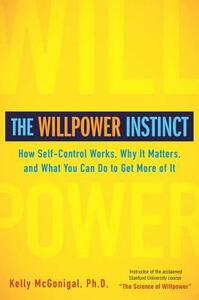Take a photo of a barcode or cover
257 reviews for:
The Willpower Instinct: How Self-Control Works, Why It Matters, and What You Can Do to Get More of It
Kelly McGonigal
257 reviews for:
The Willpower Instinct: How Self-Control Works, Why It Matters, and What You Can Do to Get More of It
Kelly McGonigal
I thought this was going to be another "do-what-I-did" type self-help books. Boy, was I wrong. I am so glad I read this book.
The Willpower Instinct is based off of a 10-week academic-style class taught by the author. It uses the latest information from neuroscience to explain what exactly your brain goes through during a thinking or decision-making process and how to use that process to your advantage to increase your sense of self-control. That may sound boring or technical, but McGonigal has a knack for communicating difficult science in lay terms with a sense of humor to boot. For example, she asks you to imagine you are walking down the street on a beautiful day, and the birds are in the trees...singing John Lennon's Imagine.
The book says at the very beginning that it offers NO EASY TRICKS to help with willpower. However, I found that to be completely wrong. Most of the techniques offered are quite simple. For example, as little as 5 minutes of exercise can boost willpower. Or just slowing down your breathing for just ONE MINUTE can also help your self-control. The science behind all these techniques are covered in-depth.
I was even amazed by some of the scientific facts that I wasn't previously aware of. I am usually up-to-date on neuroscience, so learning something new (from a scientific viewpoint) wasn't something I expected with this book.
I highly recommend this book for anyone who has ever struggled with willpower, goal setting, or motivation.
The Willpower Instinct is based off of a 10-week academic-style class taught by the author. It uses the latest information from neuroscience to explain what exactly your brain goes through during a thinking or decision-making process and how to use that process to your advantage to increase your sense of self-control. That may sound boring or technical, but McGonigal has a knack for communicating difficult science in lay terms with a sense of humor to boot. For example, she asks you to imagine you are walking down the street on a beautiful day, and the birds are in the trees...singing John Lennon's Imagine.
The book says at the very beginning that it offers NO EASY TRICKS to help with willpower. However, I found that to be completely wrong. Most of the techniques offered are quite simple. For example, as little as 5 minutes of exercise can boost willpower. Or just slowing down your breathing for just ONE MINUTE can also help your self-control. The science behind all these techniques are covered in-depth.
I was even amazed by some of the scientific facts that I wasn't previously aware of. I am usually up-to-date on neuroscience, so learning something new (from a scientific viewpoint) wasn't something I expected with this book.
I highly recommend this book for anyone who has ever struggled with willpower, goal setting, or motivation.
The bottom line is that this is worth reading, but (a) it could be 100 or 150 pages instead of 274, and (b) it is not worth paying full price for. (She could have written a 300 page version, with citations to and meatier discussion of the research, especially the neurological research, but that is not the book she wrote. She turned her lectures from a 10-week course into a book, and the ideas in that course could have been communicated in 100 pages.) Do the claims in this book seem credible? Yes. Are they surprising and counter-intuitive, leading the reader to question prior assumptions about how willpower works? Yes. Does she offer concrete suggestions in light of the research she describes? Yes.
The biggest takeaways for me, personally, were: (1) that people who are distracted are more likely to give in to temptations; (2) that regular meditators have more gray matter in the prefrontal cortex, as well as improved attention and self-control; (3) that visible temptations trigger a surge of dopamine, making it harder for the prefrontal cortex to do its job; (4) low blood sugar levels predict a wide range of willpower failures; (5) that anything we think is going to make us feel good, i.e., the promise of reward, floods us with dopamine, hijacking our attention, and many addictive behaviors – like checking email and Facebook regularly – are precisely this “reward seeking” (but never getting) behavior fueled by stead flow of dopamine; and perhaps most importantly, (6) “If you think that the key to greater willpower is being hard on yourself, you are not alone. But you are wrong. Study after study shows that self-criticism is consistently associated with less motivation and worse self-control.” Oh, and (7) restricting a food automatically increases your craving for it.
Yes, actionable suggestions throughout and at the end of every chapter. But the book is a step too far removed from the underlying science to be completely comfortable for me, the writing feels slippery and casual in places, and boy oh boy is it repetitive.
The biggest takeaways for me, personally, were: (1) that people who are distracted are more likely to give in to temptations; (2) that regular meditators have more gray matter in the prefrontal cortex, as well as improved attention and self-control; (3) that visible temptations trigger a surge of dopamine, making it harder for the prefrontal cortex to do its job; (4) low blood sugar levels predict a wide range of willpower failures; (5) that anything we think is going to make us feel good, i.e., the promise of reward, floods us with dopamine, hijacking our attention, and many addictive behaviors – like checking email and Facebook regularly – are precisely this “reward seeking” (but never getting) behavior fueled by stead flow of dopamine; and perhaps most importantly, (6) “If you think that the key to greater willpower is being hard on yourself, you are not alone. But you are wrong. Study after study shows that self-criticism is consistently associated with less motivation and worse self-control.” Oh, and (7) restricting a food automatically increases your craving for it.
Yes, actionable suggestions throughout and at the end of every chapter. But the book is a step too far removed from the underlying science to be completely comfortable for me, the writing feels slippery and casual in places, and boy oh boy is it repetitive.
Solid ideas! I've used this book (twice now) for an extended workshop series on building self-control for work. Recommended!
Quite an inspirational reading, but to be honest, I have been procrastinating since I began reading and I haven't implemented any of the advice for my big challenge. At least, I know how I should proceed!
I listened to the audiobook. This book has a lot of good information, and I can see how it could be useful.
Crazily useful book. Meditate to improve willpower. Remember your long term goal, don't label behaviors bad and good.
I don’t like self help books and was cautiously optimistic about this book. I’m glad I gave it a shot because it was practical. The author, who is a professor, references a lot of studies and explains what the discovery was and how what it reveals in our lives. I listened to this as an audiobook and got a few takeaways from it. I plan to read this as an ebook and take notes that I can apply to my life.
Some examples of tips the author provides: when stressed, don’t go shopping, or watch TV or movies for more than 2 hours. Instead try yoga, listening to music, or reading. Try to meditate for about 5 minutes a day to help your self awareness. Forgive yourself and show yourself compassion, don’t let guilt rule your life as it will make it very difficult to accomplish your goals.
Lay down on your back and slightly elevate legs with pillow under knees. Take deep breaths. If you feel tension somewhere, squeeze those muscles, and relax them. Do this for 5-10 min. Set alarm to avoid falling asleep.
When you break a rule, or hinder a goal, or something and feel guilty, guilt makes things even worse. You have to forgive yourself. Show yourself compassion.
Some examples of tips the author provides: when stressed, don’t go shopping, or watch TV or movies for more than 2 hours. Instead try yoga, listening to music, or reading. Try to meditate for about 5 minutes a day to help your self awareness. Forgive yourself and show yourself compassion, don’t let guilt rule your life as it will make it very difficult to accomplish your goals.
Lay down on your back and slightly elevate legs with pillow under knees. Take deep breaths. If you feel tension somewhere, squeeze those muscles, and relax them. Do this for 5-10 min. Set alarm to avoid falling asleep.
When you break a rule, or hinder a goal, or something and feel guilty, guilt makes things even worse. You have to forgive yourself. Show yourself compassion.
This book examines human willpower, how it works and when it doesn't. Through lots of scientific studies, it presents a series of ten "willpower experiments" that should be trialed to see if they improve your willpower. There are a lot of great insights in the book and I recommend it for anyone who is looking into how to increase their willpower or how willpower actually works.
An interesting topic with good insights. Unfortunately it's very long and somewhat repetitive.




